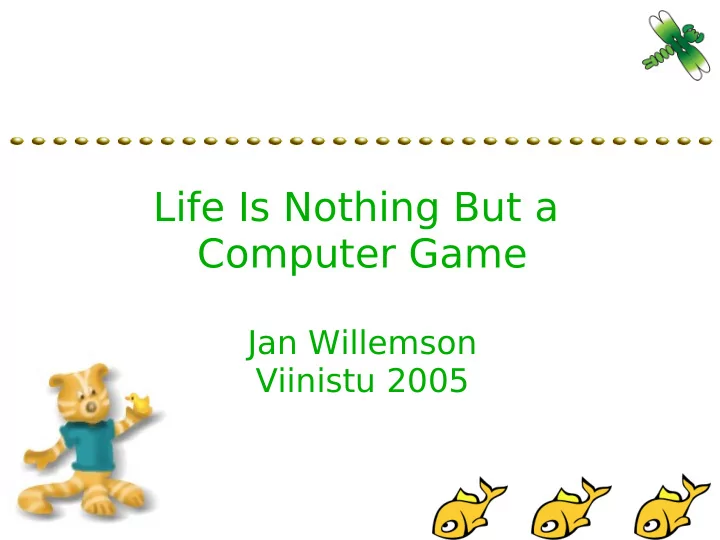

Life Is Nothing But a Computer Game Jan Willemson Viinistu 2005
Where did it all start? In 1997, I asked whether he had anything intere sting for me ... and he told me that crypto was the most exciting thing in the world For 6 years I believed him ... ... and in a way I still do ... ... but
Who really cares about crypto? Cryptographers Military Except for Estonian one Large industry Except for Estonian one Simple people do not want to know anything about it
So what should I do? Let's do something that cats would buy!
My history with games 2002 – the first seminar on Game Theory, mostly it's economical flavour 2004 – the first course on Game Theory, purely its combinatorial flavour Plus computer Clobber tournament with 34 participants and automated game playing 2005 – the second course on Game Theory, mostly combinatorial, but also some game programming Plus the first Estonian Computer Go Championships
Computer Clobber tournament at Tartu University Published in ICGA Journal, Vol. 28, No. 1 (2005), pp 51-54 The Problem: you have 34 student game programs and you want to grade them Are they intelligent or random? There is no way of understanding if you only read code Its student-quality and sometimes in a programming language you don't know Randomness can be hidden if tried
Catching random players Let's play the student program against a true random program! Say, we play 15 games and the student wins at least 11 of them The probability of this happening if the student is random, is $\sum{i=11}^15\binom{15}{i}\cdot (1/2)^i\cdot(1/2)^{15-i}\approx0.059$ Thus, we can declare a student program non-random with cofidence 94,1%
... if ... ... the outcome of a game between two random players is 50-50 We conducted simulations letting two random programs play 1000 games
Results 29 students out of 34 were able to submit programs that significantly outperformed random player 2 students submitted programs that won 4 games out of 15, i.e. performed significantly worse than the random player! The winner of the playoff was Oleg Koshik, whose program lost only one game during the whole tournament
Estonian Computer Go Championships in 2005 Held as a part of Game Theory course in spring 2005 9x9 Go, Chinese rules Random Go programs are far too weak to compare with Thus, in order to get the credit, student programs had to lose against GNUGo by less than 81 points (basically, they had to know how to live)
Results 7 programs were submitted by teams of 1-3 students 5 of them complied with the spec 4 of them tried to do better than just living In the final tournament, the program by Martin Umda & Toomas Römer won Being the only program that was not changed the night before the tournament
Computer Olympics Annually, International Computer Games Associacion (ICGA) holds three events: A CG/ACG conference World Computer Chess Championship Computer Olympics Conference and the olympics were held in Taipei in September this year Can You guess the reason why WCCC was not?
Western games room
Chinese Chess room
Clobber at the Olympics This year, Clobber was first included into the Olympiad program There were two participants ClobberA by Alexandre Grebennik (sup JW) MILA by Mark Winands
Gold medal – MILA
Silver medal – ClobberA
Lessons learned It does pay off to use transposition tables, history heuristic, temporal difference learning, iterative deepening, thinking on the opponent's time and opening books Which MILA had thanks to Mark's 4 years developed game engine that won Lines of Acton tournaments several last years Monte Carlo methods are reasonable as middle game heuristics, but extremely bad at recognizing endgames
Future work Fine-tuning Monte Carlo analysis so that its estimates would converge to minimax values Building a large endgame database and using combinatorial analysis to solve the game earlier than the opponent Produce ClobberB for the next year's Olympics in May 2006, Torino, Italy
Recommend
More recommend